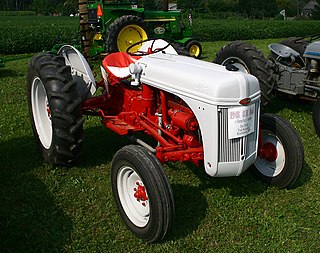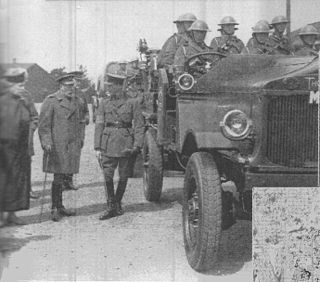
DAF Trucks is a Dutch truck manufacturing company and a division of Paccar. DAF originally stood for van Doorne's Aanhangwagen Fabriek. Its headquarters and main plant are in Eindhoven. Cabs and axle assemblies are produced at its Westerlo plant in Belgium. Some of the truck models sold with the DAF brand are designed and built by Leyland Trucks at its Leyland plant in the United Kingdom.

A tractor is an engineering vehicle specifically designed to deliver a high tractive effort at slow speeds, for the purposes of hauling a trailer or machinery such as that used in agriculture, mining or construction. Most commonly, the term is used to describe a farm vehicle that provides the power and traction to mechanize agricultural tasks, especially tillage, and now many more. Agricultural implements may be towed behind or mounted on the tractor, and the tractor may also provide a source of power if the implement is mechanised.

Steering is the control of the direction of locomotion. This is achieved through various arrangements including car steering wheels turning the wheels that touch the surface, ailerons and spoilerons in aircraft flight control systems, and rudders and propeller in watercraft. There are numerous automotive steering systems and components, which have been subject to regulations.

The Austin Motor Company Limited was an English manufacturer of motor vehicles, founded in 1905 by Herbert Austin in Longbridge. In 1952 it was merged with Morris Motors Limited in the new holding company British Motor Corporation (BMC) Limited, keeping its separate identity. The marque Austin was used until 1987 by BMC's successors British Leyland and Rover Group. The trademark is currently owned by the Chinese firm SAIC Motor, after being transferred from bankrupt subsidiary Nanjing Automotive which had acquired it with MG Rover Group in July 2005.

Four-wheel drive, also called 4×4 or 4WD, refers to a two-axled vehicle drivetrain capable of providing torque to all of its wheels simultaneously. It may be full-time or on-demand, and is typically linked via a transfer case providing an additional output drive shaft and, in many instances, additional gear ranges.

Front-wheel drive (FWD) is a form of engine and transmission layout used in motor vehicles, in which the engine drives the front wheels only. Most modern front-wheel-drive vehicles feature a transverse engine, rather than the conventional longitudinal engine arrangement generally found in rear-wheel-drive and four-wheel-drive vehicles.

The International Harvester Company was an American manufacturer of agricultural and construction equipment, automobiles, commercial trucks, lawn and garden products, household equipment, and more. It was formed from the 1902 merger of McCormick Harvesting Machine Company and Deering Harvester Company and three smaller manufacturers: Milwaukee; Plano; and Warder, Bushnell, and Glessner. Its brands included McCormick, Deering, and later McCormick-Deering, as well as International. Along with the Farmall and Cub Cadet tractors, International was also known for the Scout and Travelall vehicle nameplates. In the 1980s all divisions were sold off except for International Trucks, which changed its parent company name to Navistar International.

The Autocar Company is an American specialist manufacturer of severe-duty, Class 7 and Class 8 vocational trucks, with its headquarters in Birmingham, Alabama. Started in 1897 in Pittsburgh, Pennsylvania, as a manufacturer of Brass Era automobiles, and trucks from 1899, Autocar is the oldest surviving motor vehicle brand in the Western Hemisphere.

The Knox Automobile Company was a manufacturer of automobiles in Springfield, Massachusetts, United States, between 1900 and 1914. Knox also built trucks and farm tractors until 1924. They are notable for building the very first modern fire engine in 1905, and the first American vehicle with hydraulic brakes, in 1915.

Development of the automobile started in 1672 with the invention of the first steam-powered vehicle, which led to the creation of the first steam-powered automobile capable of human transportation, built by Nicolas-Joseph Cugnot in 1769. Inventors began to branch out at the start of the 19th century, creating the de Rivaz engine, one of the first internal combustion engines, and an early electric motor. Samuel Brown later tested the first industrially applied internal combustion engine in 1826. Only 2 of these were made.

Thornycroft was an English vehicle manufacturer which built coaches, buses, and trucks from 1896 until 1977.

A drive wheel is a wheel of a motor vehicle that transmits force, transforming torque into tractive force from the tires to the road, causing the vehicle to move. The powertrain delivers enough torque to the wheel to overcome stationary forces, resulting in the vehicle moving forwards or backwards.
Scammell Lorries Limited was a British manufacturer of trucks, particularly specialist and military off-highway vehicles, between 1921 and 1988. From 1955 Scammell was part of Leyland Motors.

Daimler-Motoren-Gesellschaft was a German engineering company and later automobile manufacturer, in operation from 1890 until 1926. Founded by Gottlieb Daimler (1834–1900) and Wilhelm Maybach (1846–1929), it was based first in Cannstatt. Daimler died in 1900, and their business moved in 1903 to Stuttgart-Untertürkheim after the original factory was destroyed by fire, and again to Berlin in 1922. Other factories were located in Marienfelde and Sindelfingen.
Muir Hill (Engineers) Ltd was a general engineering company based at Old Trafford, Manchester, England. It was established in the early 1920s and specialised in products to expand the use of the Fordson tractor, which in the pre-war days included sprung road wheels, bucket loaders, simple rail locomotives, and in particular in the 1930s they developed the dumper truck. Later they built high horse power tractors.

Straker-Squire was a British automobile manufacturer based in Bristol, and later Edmonton in North London.

The Russian Empire was one of the first countries to create a driving licence. Russia's first licences were issued in 1900 by Saint Petersburg authorities, and Russia joined an international convention in 1909. However, due to relatively small number of cars, the attempts to create a standardised Russian licence were rather sporadic and limited to major urban areas. No comprehensive system of driver licensing was present until 1936, when the Soviet government organised and standardised traffic and driving regulations, with the state-wide system regulated by specialised police authorities.

The Thornycroft Hathi was an early four wheel drive lorry built by Thornycroft in the 1920s. It was used by the British Army as an artillery tractor.

Protos of Nonnendamm was a German car manufacturing company founded in 1898 in Berlin by engineers Alfred Sternberg and Oscar Heymann.



















